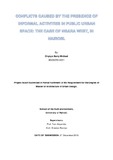| dc.description.abstract | One half to three quarters of non-agricultural employment in developing countries is to be found in the informal sector. Specifically, these figures amount to 48% in the whole of Africa, 51% in Latin America, 65% in Asia, and 72% in Sub-Saharan Africa excluding South Africa (Mitullah, 2006). Low-income earners in developing world towns/cities rely on informal economic activities for survival because they provide ample opportunities to support their livelihoods. Recent empirical research has shown that informal income generating activities are not the reserve of the poor, all income groups have engaged in this mode of production (Tranberg & Vaa, 2004).
Whether analysts are considering specific aspects of the urban informal sector or the role of that sector in general, it is important to understand how the sector has developed and how it changes over time, and its interacts with and effect on the city context. We already know in a general way the many problems associated with urban informal economic activities, however, there are only few well documented case studies of informal sector activities. This study draws attention to some neglected aspects of informal sector research, especially one which relates to their place in the city and whether or not they can legitimately lay claim to urban goods and services: an area which should be further investigated by researchers undertaking field research on the informal sector. Informality has been the mode of city making in Nairobi for the last 40 years or so as opposed to formal development. By focusing on informal economic activities in public urban space in Nairobi, the study explored the production and consumption of urban space as driven by informal processes and how these manifests and affects use of this space.
The study has revealed that informality is not only a response to the bottlenecks encountered in the endeavour to access the available capital, but is also an urbanisation process that interacts and shapes urban space which the marginalised lay legitimate claim to participating in shaping the urban space to which they are part. The study also explored the current urban design and planning process with a view of considering the debate that the modality of planning, as currently configured, produces the unplannable, informality as a state of exception from the formal order of urbanization (Roy, 2005). The study further revealed that in Nairobi, abstract space tends to present informality as retrogressive and negative which stifles the realization of a truly inclusive city; informality harnessed, begins to forge to path in response to the call for a universal right to the city. | en_US |

